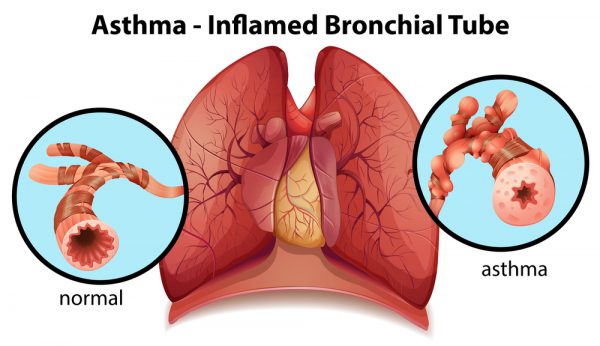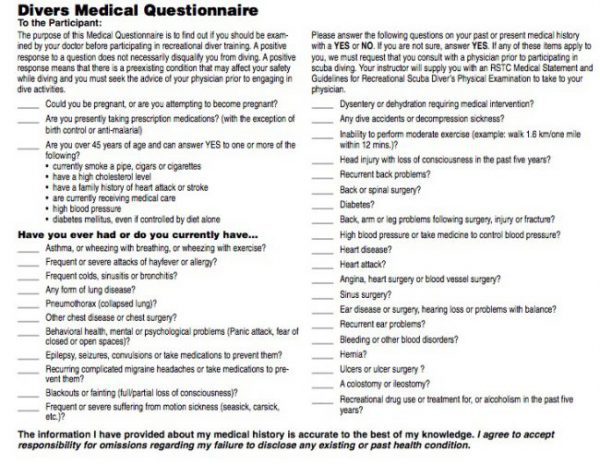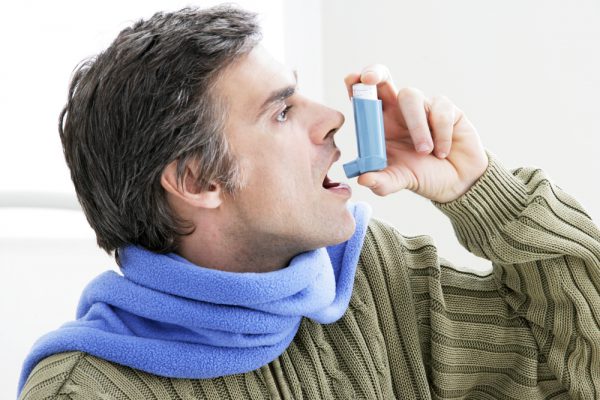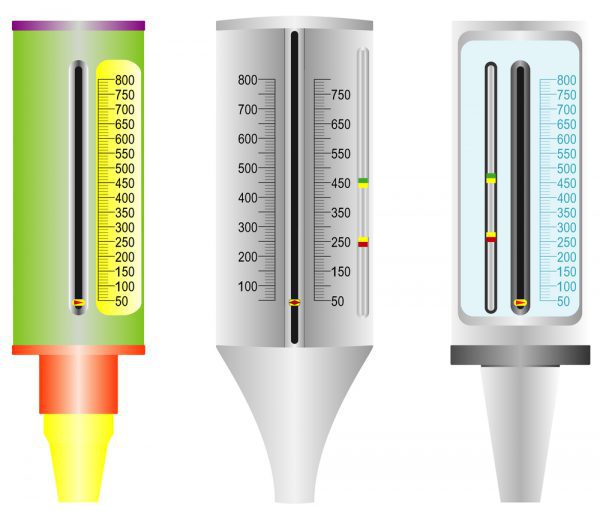For years, asthma and scuba diving together have been a long-standing controversial topic among the dive professions and the dive medical community.
So, the big question ‘Can you dive with asthma’? The answer is yes BUT there are some things you need to understand first. You are at a higher risk of an accident or injury when diving but as long as the asthma is controlled you can dive.
This article will explain the concerns of asthma for divers who are asthmatic and how to control it when scuba diving, and includes a great video.
What Is Asthma and How Can It Affect The Diver With Asthma

In case you’re not familiar with asthma, asthma is a chronic disease that affects the airways and makes breathing difficult.
The air passages are red and swollen, causing a temporary narrowing and prevents a good flow of oxygen to the lungs which result in symptoms of wheezing, chest tightness, coughing and shortness of breath. If it’s severe enough, the individual can have the inability to speak along with a decreased activity.
Asthma is not an ongoing response and it can suddenly happen when triggered by a response to certain stimuli causing an asthma attack. The triggers are different for each person. It can be caused by:
- Airborne Substances. Dust, pollen mold spores, cold, dryness
- Respiratory Infections. Colds
- Airborne Pollutants. Smoke
- Certain Medications. Aspirin, Ibuprofen, Aleve, Motrin, Advil
- Cold air *
- Physical activity that can induce asthma
- Stress, panic
- Preservatives and sulfites used in certain foods and beverages like beer and wine.
My Story
In 2007, I was working for a dive shop in Grand Turk and booked a dive for a family of divers who came from a cruise ship. I had them all sign the standard Diver Medical Questionnaire form which includes the question of ‘Have you ever had or do you currently have asthma, or wheezing with breathing, or wheezing with exercise?’. All dive participants specifically wrote ‘No’ and signed the document. About 8 minutes into the dive, one of the divers panicked and quickly started to ascend, fortunately, the tour guide (Owner and professional Dive Instructor) prevented him from doing a quick ascent, and together and slowly they made their way to the surface.
This diver at the surface was yelling he has asthma and said he couldn’t breathe.
Thankfully, he was able to get his bronchodilator once on board the dive boat. Of course, the dive was aborted.

The Concerns For Divers And Asthma
The normal breathing pattern for divers is different from that of breathing on the surface, they breathe slowly and deeply underwater to get better breathing efficiency.
Some factors of concerns:
Divers breathe compressed air that has been filtered and dehumidified from cylinders. When the diver takes a breath of this air thru his regulator, the relief valve would first chill the air.
The diver inhales this cold dry air and if hyperventilation occurs during the descent, it could cause the diver’s airway to narrow. This could be a very high induced exercise activity to trigger asthma.
Another concern is, the sea water is cold and if the diver takes in a bit of seawater from a leaky mouthpiece, it can trigger an asthma attack.
What Happens If Your Lungs Constrict Underwater?
When a diver starts to descend underwater, he/she is faced with the pressure of the water which is much denser and heavier than that of air. A diver that succumbs to an asthma attack underwater is experiencing a decrease of airflow going in and out of the lungs and the normal diver underwater breathing pattern ‘breathe slowly and deeply’ and exhale fully is now compromised. The diver is not able to get enough air from his regulator let alone expel the air out.
Your lungs are now constricted underwater and you have 2 problems. First of all, it will be difficult to breathe properly underwater. You will experience tightness in the chest and buildup of carbon dioxide.
Second, you now have gas trapped in your lungs and not able to release it and so you face the risk of lung overexpansion injury. The good news is the occurrence of this happening is not often and so because of that, asthma is not often associated with lung overexpansion injury, even severe injuries or death. Instead, the DAN (Divers Alert Network) studies show divers who succumb to asthma underwater, will find they are prone to losing consciousness because they are so much out of breath, or panic, or become incapacitated. This is the biggest issue with divers when a trigger hits causing an asthma attack.
This is why even as recently as five years ago, people who have asthma and have had a desire to learn to scuba dive and divers with asthma have been denied the pleasures of scuba diving.
Thanks To Modern Medication

Studies show there are many divers who are asthmatic and they seem fine and now with modern medication which stabilizes the lung functions such as cortisone inhalation. This reduces inflammation in the inner lining of the lung’s bronchial tubes opening the airway.
Bronchodilators, open the airway passages and are used by many people who have asthma.
With these products now available through your family physician, it seems the concerns for divers who are asthmatics are been alleviated to a big extent, however, the concern is not whether you have asthma, but how well the asthma is controlled.
As long as the airway passages are open, normality in the lung functions and the response to exercise prevents the lungs from closing up then you won’t be denied the joys of scuba diving.
Now just because you have the certification to dive doesn’t mean you can dive on a certain day. Just like any other diver who has a head cold, sensitively to airborne pollutants and substances or not feeling well. You should not dive.
Peak Flow Meter

A relatively inexpensive, handheld portable device, the peak flow meter also recommended by DAN (Divers Alert Network), is perfect for people who have asthma. You can easily get it off the counter at larger pharmacies. The medication is prescribed by your physician. The device measures how well the air moves out from your lungs.
You want to use the device as needed and 2 days after your dive, monitor your airflow by blowing into it. If there is a 10% deviation, meaning your airflow function is down then your lungs are not functioning as well as they should be. It means you don’t dive and you should use your medication.
It’s important to meet with your family physician on an annual basis to follow up on your asthma condition.
The best part is, everything is in your control as a diver and as long as you are sensible, the response of NO will no longer be applied.
Dive Physician
Want the best of both worlds? Going to a dive physician is a great option, they already understand the physiology of diving in addition to the issues of asthma and the real importance of being able to control asthma when scuba diving. Asthma consultation and treatment and regards to diving theory!
Controlling The Asthma Effect
The controlling the asthma effect is how long the medication would last once you’ve used it. Cortizones and bronchodilators are long-acting and normally will last up to 12 hours or more but if you use Ventolin inhalers they will only work for about 4 hours so there is a very good possibility it will not be effective during your dive. This is one of the reasons why people with asthma were rejected from diving.
Control the asthma effect… you can dive!
How Deep Should You Dive If You Are Asthmatic?
If your lungs function normally there is no depth restriction, other than as recreational divers, the depth recommended is no deeper than 130 feet/40 meters.
Whether you have a medical issue or not, you would still need to consider the what ifs. In other words, if you had an asthma attack underwater, will you have the time to do safety stop(s) that are long depending on your depth. You certainly don’t want to be spending 90 minutes decompression time. As recreational divers, you don’t want to be doing decompression stops anyway. Be a conservative diver always, whether you had a medical issue or not.
Conclusion
By now you already know the answer is yes, you can dive as long as the asthma is controlled. Be a conservative diver and if you don’t feel well for whatever the reason may be, don’t dive. Don’t take chances or risks… it’s your life and your decisions affect the outcome of your life.
Thank you for reading and if you have any stories to share that can help the readers, including myself, I really would like to hear from you. Comments and questions are welcomed, please put them in the Comment Box below.
Kind Regards,
Monica
